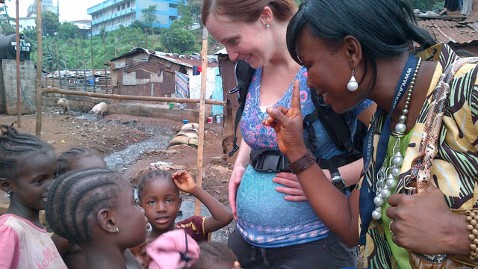‘Cry Out in Pain’: Pregnant American Doctor Shocked by Labor in Sierra Leone

Pregnant OBGYN, Dr. Erin Carey, traveled to Sierra Leone with ABC News to look at maternity care
Dr. Erin Carey, a second- year fellow in obstetrics and gynecology at the University of North Carolina, Chapel Hill, traveled to Sierra Leone with ABC News in November and spent two days at Princess Christian Maternity Hospital.
By DR. ERIN CAREY
When we walked into the labor and delivery ward at Princess Christian Maternity Hospital in Freetown for the first time, we found a laboring woman lying on the floor, far from her bed. We asked the nurses why she was there and the response was very surprising. They told us that it was the woman's negligence; it was her fault that she had fallen from the bed and continued to labor on the floor. There was no rush to assist her, to put her back where she should have been so that she could labor in a more comfortable position. We moved the woman back to a bed and soon she needed to push. The baby came very quickly.
When women arrive at the Princess Christian to give birth, they are usually accompanied by a couple of family members or friends. Once admitted, the hospital personnel place the laboring mom on an isolated bed in the maternity ward, separating her from friends and family to labor - more or less - alone. The nurses may or may not make it back to be with her before the delivery and there is little in the way of monitoring her labor progression.
Watch more of Dr. Carey's story this Friday on "20/20? at 10 p.m. ET
The women we met very much wanted support. They were scared. We saw women reach out for us and cry out in pain. They wanted to be held or touched or told how to breathe. They wanted to be reassured that they were going to be OK. I think this is completely natural, no different from what you would see in the US. But it helped me understand why women in Sierra Leone would choose to labor at home or have a traditional birth attendant, rather than labor in the hospital. There's more support at home. And there's isn't any anesthesia at the hospital. The only thing to comfort these women - wherever they give birth - is physical touch and kind words.
What really shocked me was discovering that the midwives and nurses here have adequate training. Whenever we were in the middle of an emergency and I looked at the patient's chart, I saw that her care plan was correct. The medical personnel here know what to do and they have the medication needed. But administering the proper care seemed almost impossible. There was no structure, no organization, and no accountability at the hospital. No one took charge. And the midwives and nurses must know why women die here. This attitude of care provision is something that can be improved.
My time in Sierra Leone allowed me to really put myself in someone else's shoes. I'm six months pregnant, and am able to make an immediate connection with the other expecting women-we share a maternal bond. But in the same sense, I look at them and think, "I am really very fortunate for having the care I have in the US." And not only the care during pregnancy, but also the care and support I will have during my labor and delivery. This experience has made me think about my own delivery experience. I'm an OBGYN and though I know bad things can happen, I have a peace that I will be safe during this process. I will survive my labor and delivery. I'll be able to enjoy my child. We can see that future because of the health care system we have in the United States.
I now understand how different my experience is from the woman who we met laboring on the floor, from all of the women who need to worry about surviving delivery. Even the women in Sierra Leone who have straight-forward labor and relatively easy deliveries still struggle to connect with their new babies. They cannot help but wonder, "Will the baby live to survive the first month? The first year?"